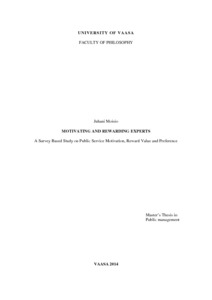Motivating and Rewarding Experts. A Survey Based Study on Public Service Motivation, Reward Value and Preference
Moisio, Juhani (2014)
Kuvaus
Opinnäytetyö kokotekstinä PDF-muodossa.
Tiivistelmä
The present study wanted to explore the motivation of experts working in a public organisation, especially in reference to Public Service Motivation. Furthermore the present study wished to find out the types of rewards experts in the public sector value and the possible contrast with the rewards they wish to receive.
The theoretical framework relied on different findings on Public Service Motivation, Two existing models of Public Service Motivation were combined to create a more holistic model of Public Service Motivation including individual and organisational attributes as well as their interaction and situational attributes. The organisational attribute of rewards was examined in closer detail.
An Internet survey was conducted at the ELY Centre of Lapland where 100 self-identifying experts answered a questionnaire. They were asked to mark motivating factors based on the Holistic Public Service Motivation Model. They were also asked to mark the rewards they value and the rewards they would like to receive.
The data clearly showed that for a half of all the respondents and for all the groups formed by the different individual and organisational variables (16 out of 16) the most motivating factor was interesting work and job assignments. There was a clear difference to the second most motivating factor of salary and monetary rewards, which was closely followed by the third most motivating factor of responsibility and pride of own work in the responses by all the respondents. The Holistic Public Service Motivation Model was supported by the findings of the present study, all of the individual and organisational attributes got selections in the survey. The data also showed the importance of organisations in Public Service Motivation as the organisational attributes got more selections than the individual ones.
The second part of the research focused on rewarding experts. It was shown that experts value and prefer or want to receive different types of rewards. The data showed that the most valued rewards by all the respondents were interesting work assignments, followed by authority and responsibility over own tasks and their execution, and then by rewards measured in money. Interesting work assignments was also the reward most valued by a clear majority of the groups formed by the different variables (14 out of 16). The data also showed when asking the types of rewards experts would like to receive that that the reward concept of rewards measured in money was the most preferred. It was the most preferred reward concept by all the respondents and majority of the groups formed by the different variables (nine out of 16).
Experts relate to their work, this is what they find motivating and these are the types of rewards they value and also to some extent want to receive. However, the importance of monetary rewards should not be underestimated and does not crowd out Public Service Motivation as some studies suggests, on the contrary, for many monetary rewards might equal recognition and approval of a job well done.
The theoretical framework relied on different findings on Public Service Motivation, Two existing models of Public Service Motivation were combined to create a more holistic model of Public Service Motivation including individual and organisational attributes as well as their interaction and situational attributes. The organisational attribute of rewards was examined in closer detail.
An Internet survey was conducted at the ELY Centre of Lapland where 100 self-identifying experts answered a questionnaire. They were asked to mark motivating factors based on the Holistic Public Service Motivation Model. They were also asked to mark the rewards they value and the rewards they would like to receive.
The data clearly showed that for a half of all the respondents and for all the groups formed by the different individual and organisational variables (16 out of 16) the most motivating factor was interesting work and job assignments. There was a clear difference to the second most motivating factor of salary and monetary rewards, which was closely followed by the third most motivating factor of responsibility and pride of own work in the responses by all the respondents. The Holistic Public Service Motivation Model was supported by the findings of the present study, all of the individual and organisational attributes got selections in the survey. The data also showed the importance of organisations in Public Service Motivation as the organisational attributes got more selections than the individual ones.
The second part of the research focused on rewarding experts. It was shown that experts value and prefer or want to receive different types of rewards. The data showed that the most valued rewards by all the respondents were interesting work assignments, followed by authority and responsibility over own tasks and their execution, and then by rewards measured in money. Interesting work assignments was also the reward most valued by a clear majority of the groups formed by the different variables (14 out of 16). The data also showed when asking the types of rewards experts would like to receive that that the reward concept of rewards measured in money was the most preferred. It was the most preferred reward concept by all the respondents and majority of the groups formed by the different variables (nine out of 16).
Experts relate to their work, this is what they find motivating and these are the types of rewards they value and also to some extent want to receive. However, the importance of monetary rewards should not be underestimated and does not crowd out Public Service Motivation as some studies suggests, on the contrary, for many monetary rewards might equal recognition and approval of a job well done.
